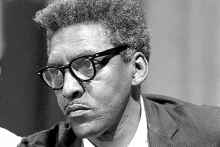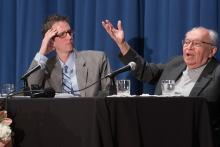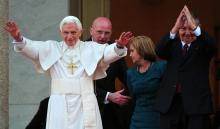Communism

I was in high school, visiting my grandparents’ church in Peru, Ind., and the theme for the Sunday school class was “money.” The teacher was quick to bring up a verse that has always sounded like it would be a better fit in Benjamin Franklin’s Poor Richard’s Almanack than the Bible. “The love of money is the root of all evil,” the teacher said, summarizing and abbreviating 1 Timothy 6:10. “It’s not that money itself is evil. Objects, in and of themselves, cannot be evil,” he explained. “It’s a matter of the heart.” That logic sat weirdly with me and so I raised my hand to respond. “Don’t we believe that idols are objects and that they are evil? Also, doesn’t the Bible teach us to resist temptation? So wouldn’t it make sense to resist the temptation of money to avoid all the evil that comes with it?”

Rustin, who died in 1987, is best known for helping Rev. Martin Luther King Jr. implement Gandhian tactics of nonviolence and for the key role he played organizing the 1963 March on Washington and the Southern Christian Leadership Conference — two key components of the civil rights movement.
Less well-known are the particularities of Rustin's faith, including his deep roots in the Quaker and African Methodist Episcopal churches which drove his activism. Those two faith traditions, marked by silence and singing, respectively, echoed throughout Rustin’s life and work.

We are living in a time of unprecedented economic disparity between the rich and the poor, the haves and the have-nots. Masses live in poverty so that a handful of people can live as they wish. The world’s three richest people own more than the combined economies of 48 countries. The average CEO in the US is making 400 times the average worker.

Reagan and John Paul helped spell doom for the Soviet empire, and the pontiff waged a decades-long campaign inside the church — helped by his doctrinal chief, Cardinal Joseph Ratzinger, who would later become Pope Benedict XVI — to quash liberation theology and silence its most ardent supporters.
Today, however, it’s a wholly different story — and to listen to the Rev. Gustavo Gutierrez, the Dominican priest from Peru who is known as the father of liberation theology, one might wonder what all the fuss was about.

Christian conservatives who think Satan is using communism and Islam to bring down America can add a new “adversary” to the list: the Emergent Church movement.
A portion of the upcoming Values Voter Summit in Washington will stray from its usual focus on politics and consider the Emergent Church as one of three “channels the adversary is using to bring America down.” Art Ally, president of The Timothy Plan, a Florida-based mutual fund company devoted to “biblically responsible investing,” will lead the breakout session.
“Why would Satan use Communism? It’s a godless form of government,” said Ally. “Why would Satan use Islam? Same reason. It’s not a religion. It’s a movement to dominate the world under the guise of religion. The Emergent Church plays right into that by weakening further our church community.”

GROWING UP IN the Catholic Church in Cuba, Romy Aranguiz learned to perform acts of charity on limited resources—and to carefully seek out dialogue when the laws of the land seemed to run contrary to her moral compass, or to the government's own professed ideals.
"For me, the church is the best representation of civil society in Cuba. It was probably the only institution that kept a certain distance from the government when there was hardly an opposition," she said in a recent phone interview from her home in Massachusetts.
Now a medical doctor in the U.S., Aranguiz continues to implement those lessons, these days through Cuban Americans for Engagement (CAFE), a movement aimed at broadening U.S.-Cuba relations through citizen exchange, open trade, and diplomatic cooperation.
Like most of CAFE's founding members, Aranguiz is a Cuban Gen Xer who obtained her education on the island and migrated to the U.S. as an adult. She developed a penchant for blogging while pursuing a professional career and obtaining U.S. citizenship.
CAFE's members are focused on breaking the silence they experienced in communist Cuba—and the silence they encountered as new immigrants to the U.S., where the Cuban-American agenda was often set by older exiles with no interest in a U.S.-Cuba dialogue.
"I think CAFE is having a positive impact on previous generations of Cuban Americans and Latinos in the U.S., descendants from first migratory waves," says CAFE board member María Isabel Alfonso, a professor at St. Joseph's College in New York. "CAFE has come to fill a void, as it values diplomacy and engagement over a confrontational, Cold War mentality."

Pope Benedict XVI’s 3-day visit to Cuba began Monday, when President Raul Castro greeted the pontiff at the airport of Santiago de Cuba. The arrival was fairly quiet, but the evening Mass in Santiago’s plaza was attended by an estimated 200,000 Cubans. The pope's long-awaited visit attracted news coverage from around the world, mostly focusing in the pope’s message.
Albania was perhaps the most closed society in the world during the Cold War, with absolutely ruthless persecution of all religion. Churches were destroyed in every corner of that country. Clergy were eliminated. Worship was outlawed. And enforcement was brutal.
When Communism fell, and the country opened for the first time in decades, the Albanian church began a miraculous process of rebirth. We heard the moving story of the Albania Orthodox Church, rebuilding countless church structures, but even more importantly, restoring faith in the hearts of its people. I've known its leader, Archbishop Anastasios, from past encounters at the World Council of Churches, and he surely is a saint. The revival of religious faith in Albania and its compassionate service to those in need is a magnificent story of the church's witness, and the Spirit's power.
It was announced today that Glenn Beck will end his program on the Fox News Channel later this year in order to create a "variety of television projects for air on the Fox News Channe
I got up at 4:30 a.m. on Tuesday morning to fly to Phoenix, Arizona, to speak at a press conference and rally at the State Capitol at the invitation of the state's clergy and other leaders in the immigration reform movement.
The Catholic church is reeling from the several sexual abuse allegations that have come to light over the past three months. Downplaying the severity of this scandal will only further damage the already beleaguered church's image and credibility. Many in the media blame Pope Benedict XVI for the mismanagement of the sexual abuse crisis.
Last week, when radio and television talk show host Glenn Beck said that social justice i
By now, most of you have heard the brouhaha regarding what Glenn Beck said on his radio and TV show recently:
Glenn Beck says Christians should leave churches that use the word "social justice." He says social justice is a code word for communism and Nazism.